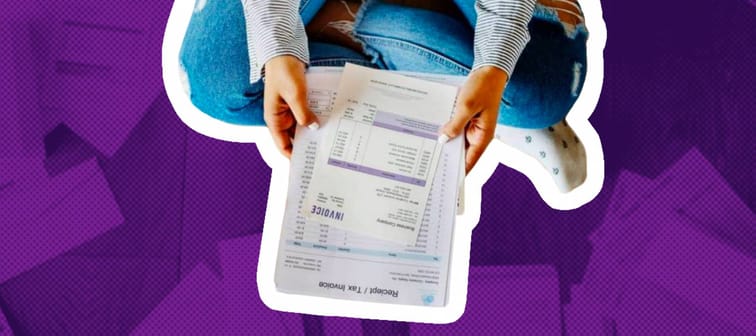How debt consolidation works
Let’s say you have $25,000 in debt spread across two different credit cards, two outstanding medical bills and a student loan.
| Debt | Amount owed | Interest rate | Minimum monthly payment |
|---|---|---|---|
| Credit card #1 | $10,000 | 22% | $300 |
| Credit card #2 | $5,000 | 21% | $150 |
| Medical bill #1 | $2,000 | 0% | $60 |
| Medical bill #2 | $3,000 | 2.5% | $90 |
| Student loan | $5,000 | 5.8% | $150 |
It can be pretty overwhelming to manage all of that. Not only do you need to keep track of five different payment cycles, you may have five different interest rates and five different minimum payments to handle.
Meanwhile, the interest on credit cards compounds monthly — that’s interest both on the amount you borrowed and on the interest you’ve already accrued. If you’re making only the minimum payments on your credit cards, your debt problem will get worse and worse with time.
At that point, you need to find a solution.
When you consolidate debts, you take out a new low-interest loan and use it to pay off all of your high-interest debt. That can give you some breathing room and also keep you more organized as you work to pay it off.
You’ll have just one bill each month and, if you choose a fixed plan, you’ll know exactly when your debt will be paid off.
You’ll also have the chance to set new terms. If you want to get out of debt sooner and save on interest, you can choose a shorter repayment plan.
Or you can choose a longer plan, giving you smaller monthly payments and some extra time to rebuild your finances.
Remember, when choosing new terms, make sure your monthly debt payments don’t exceed 40% of your monthly income before taxes. Otherwise, you’ll struggle to meet your needs. Go for a longer repayment plan if you must, but know that you’ll lose more in interest that way.
Kiss Your Credit Card Debt Goodbye
Having a single loan to pay off makes it easier to manage your payments, and you can often get a better interest rate than what you might be paying on credit cards and car loans.
Fiona is an online marketplace offering personalized loan options based on your unique financial situation.
When you consolidate your debt with a personal loan, you can roll your payments into one monthly installment. Find a lower interest rate and pay down your debt faster today.
Get StartedHow to consolidate debt
There are a few ways to consolidate your debt into one single loan.
1. Personal loan
A personal loan from a bank, credit union or online lender is the simplest option. And because the interest rate is usually fixed, you can feel confident that your payments won’t change.
The interest on personal loans generally ranges from around 6% up to 36% APR. Your rate will be determined by factors including your credit score and the lender you choose.
Personal loans are either secured — meaning you have to put up some sort of collateral, like your car — or unsecured.
Secured loans come with better interest rates, but they're riskier: You forfeit your collateral if you stop paying.
More: Get back on track with a debt consolidation loan with Credible
2. Home equity loan or HELOC
A home equity loan or home equity line of credit is a secured loan that allows you to borrow against the equity in your home to pay off your other debts.
Rates on HELOCs are considerably lower than the average rates on credit cards because you’re putting some serious collateral on the line. Namely, you could lose your house if you stop making your monthly payments.
A balance transfer credit card offers you the opportunity to move your debts onto a card that, for a period of time, offers a low or 0% interest rate.
Balance transfers are a savvy way to slash your costs. But watch out, because you may be required to pay a fee of up to 5% on whatever balance you move over. You'll want to see if you can score a card that doesn't have a balance transfer fee.
And don’t forget, that introductory low rate is only temporary. You’ll want to spend that period paying off the balance in full if you can. Otherwise, you might end up paying more in interest than you were before.
3. Retirement account loan
Taking out a loan against your 401(k) plan or other retirement account might be considered a fourth option, but that's generally a bad idea.
These loans must be paid back within five years, and if you default you can find yourself owing income tax and a steep 10% early withdrawal penalty. Not to mention that you'll have less money to retire on.
Is debt consolidation a good idea?
Pros of debt consolidation
There are plenty of good reasons to consider debt consolidation, including:
-
It makes your debt more manageable. When you combine several balances into one loan, you have fewer bills and payment schedules to juggle.
-
You'll save on interest. While you’ll want to look at some quotes, these loans usually come with lower rates, meaning you'll stop losing so much in interest and free up money you can use to aggressively pay off your debt. Plus, the problem will stop growing because of your credit cards’ compounding interest.
-
You can get a fixed rate. Knowing that your interest rate won’t increase will give you some peace of mind and help you organize your payments. The only exception is a credit card balance transfer, where your low or 0% interest rate is just temporary.
-
You can set a plan. Because personal loans carry a fixed term, you're forced to commit to a plan to fully pay off your debt, typically in two to five years.
-
You can boost your credit score. Your score will benefit if you make your consolidation loan payments on time and you leave your older, paid-off accounts open. That lowers your "credit utilization," or the amount of your available credit that you're using, which is one of the main factors in calculating your score.
Cons of debt consolidation
No solution is perfect. Consolidation doesn’t just make your debt disappear, and there are definitely risks and downsides to consider:
-
Your credit can take a hit. Applying for a loan or credit card to pull together your debt will result in a "hard inquiry" into your history, which may knock a few points off your credit score. Luckily, this is temporary, and there are many strategies to help boost your credit score fast.
-
You may lower the average age of your credit accounts. If you close your credit cards and other loans when you replace them, you may shorten your credit history, which also can be bad for your credit score.
-
You can put your stuff at risk. Borrowing against your home, car or other assets can backfire if you aren’t diligent about sticking to your repayment schedule.
-
You may not reform your bad spending habits. As the Consumer Financial Protection Bureau puts it, "If you get a consolidation loan and keep making more purchases with credit, you probably won’t succeed in paying down your debt."
Stop overpaying for home insurance
Home insurance is an essential expense – one that can often be pricey. You can lower your monthly recurring expenses by finding a more economical alternative for home insurance.
SmartFinancial can help you do just that. SmartFinancial’s online marketplace of vetted home insurance providers allows you to quickly shop around for rates from the country’s top insurance companies, and ensure you’re paying the lowest price possible for your home insurance.
Explore better ratesBeyond debt consolidation
Debt consolidation is only the first step. Use this opportunity to change your financial habits, too. Start by setting a budget, and tracking your expenses and savings.
Also, use the money you’re saving to build a rainy day fund or start investing for the future.
While debt consolidation can be a smart way to free yourself from debt, you must becommitted to the new plan and go about it the right way.
And remember that your credit score has to be decent enough to land a good deal on your new loan; check your credit score online for free. A solid score will help you land a better interest rate, and that’s half the point of consolidation.
Sponsored
Follow These Steps if you Want to Retire Early
Secure your financial future with a tailored plan to maximize investments, navigate taxes, and retire comfortably.
Zoe Financial is an online platform that can match you with a network of vetted fiduciary advisors who are evaluated based on their credentials, education, experience, and pricing. The best part? - there is no fee to find an advisor.








